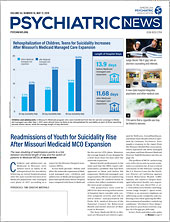Most residency programs lack formal leadership training. We focus on clinical skills training and learning about evidence-based medicine, but not other skills—such as diversity, mentorship, and advocacy—that could also further our field. Is there an effective, reproducible way to turn the residents of today into the leaders we need for tomorrow—that is, through “evidence-based leadership”?
APA has been conducting such a leadership experiment through the APA/APAF fellowships. Through programs in leadership, public psychiatry, research, diversity and minority leadership, substance use, policy, and child and adolescent psychiatry, APA brings residents from across the country to work with APA leaders, serve on councils, present at national meetings, and network with leaders and peers. By investing early in trainees’ careers, APA hopes to create effective and engaged leaders to guide our field through the challenges to come. Indeed, many former fellows are now in leadership positions, like current APA President Altha Stewart, M.D., and APA CEO and Medical Director Saul Levin, M.D., M.P.A.
Four years ago, APA decided to go one step further by creating the APA/APAF All Fellows’ Orientation. The day before the APA Component Meetings in September, when APA’s various advisory bodies meet, fellows were to gather for formalized orientation and leadership training. Through networking, breakout sessions, and keynotes from leaders, fellows would be prepared to take full advantage of APA’s resources. But would it work? How would we know?
Let me first share my story. In 2016 as a rising PGY-3, I applied for the Leadership Fellowship. I had enjoyed my advocacy experience with the Illinois Psychiatric Society and wanted to engage with APA at the national level. Before my first orientation, I remember reading the impressive comments of other fellows about their experiences and feeling a growing sense of imposter syndrome: Was I of the same caliber as these impressive young men and women? With this and similar thoughts in my head, I flew to my first orientation with both excitement and trepidation.
The night before orientation, the Leadership Fellows held an informal meet-and-greet. I was amazed by the variety of our backgrounds and passions, but also our core similarities—we all wanted to do more, to be more. The next day, we listened to talks by APA leaders and learned about APA’s complex structure and how ideas became policy. I also attended breakout sessions on forming partnerships and developing an academic career. The next day, I attended the meeting of APA’s Council on Consultation-Liaison Psychiatry, sitting among luminaries whose names were in my textbooks. Amazingly, the council not only welcomed but also encouraged feedback from residents, and by the end of that first meeting, I had joined a work group on psychotropics and QTc prolongation. As I look back on my orientation experience, I realize I gained an expanded notion of what psychiatry can teach residents.
Back to my initial question: Is there such a thing as evidence-based leadership? To answer that, APA collected data from 277 fellows who had participated in an orientation, asking whether participants strongly disagreed, disagreed, were neutral, agreed, or strongly agreed with statements about the orientation and APA. Initial results are encouraging. The overwhelming majority of fellows either strongly agreed (49.6%) or agreed (46%) that orientation met their expectations, and strongly agreed (53.2%) or agreed (40.2%) that orientation was a meaningful use of their time. Regarding career development, fellows strongly agreed (50.7%) or agreed (40.9%) that orientation provided useful career information. Most fellows strongly agreed (67.2%) or agreed (27.4%) with the statement “APA performs critical work to safeguard the future of our profession.” More importantly, fellows strongly agreed (56.9%) or agreed (28.5%) with the statement “Orientation changed my perception of the role of APA for my future career development.” Clearly, orientation is meeting the needs of APA/APAF fellows and making a positive impact on their views of organized psychiatry.
While I’ve had many incredible opportunities through the APA/APAF Leadership Fellowship, the best part is having met my co-fellows, now some of my dearest friends and colleagues. As I transition into my first academic job, I’ve found the process to be surprisingly isolating, and it’s been comforting to have my fellows to lean on. This is probably the most important piece of evidence about the value of the APA/APAF fellowships—that as health care changes, APA can best equip trainees to face its challenges by simply helping them find each other. We are stronger together—it’s in the evidence. ■
More information about the APA/APAF fellowships can be accessed
here.

